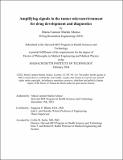Amplifying signals in the tumor microenvironment for drug development and diagnostics
Author(s)
Martin Alonso, Maria Carmen
DownloadThesis PDF (94.11Mb)
Advisor
Bhatia, Sangeeta N.
Terms of use
Metadata
Show full item recordAbstract
The advent of molecular biology and next-generation sequencing has significantly transformed our understanding of cancer and the delivery of cancer care. These advancements greatly accelerated the pace of biological discovery leading to the development of targeted therapies and immunotherapies, which have resulted in unprecedented survival benefits for patients. Additionally, they have also materialized in how disease is diagnosed and monitored, which increasingly involves genomic profiling of circulating tumor DNA (ctDNA) molecules in liquid biopsies such as blood. Despite the promise offered by these innovative therapies and monitoring tools, their broad integration into clinical practice faces important challenges. Widespread adoption of emerging therapies demands enhanced tools to successfully identify therapeutic targets and to restrict their potent activity to cancer cells. At the same time, improving the sensitivity of ctDNA-based tests, that remains limited by the scarcity of ctDNA in blood, holds the key to unlock the full potential of liquid biopsy across many important clinical applications.
This thesis addresses these critical challenges by combining the unique opportunities posed by secreted molecules in the tumor microenvironment (TME) with engineering principles of signal amplification. Tumors are intricately tied to their local and systemic microenvironments for tumor progression, and key to orchestrating such interactions are secreted molecules. Targeting these abundant molecules that are accessible extracellularly and oftentimes even systemically, offers significant advantages over traditional approaches that target confined, scarce and occult malignant cells within tissues.
In Part I of this thesis, we propose exploiting the catalytic activity of tumor-associated proteases in the local TME to selectively deliver potent therapies to cancer cells while sparing healthy tissues. Leveraging advancements in high throughput screening and in deep learning, we contribute important tools for the effective design of conditional drugs that require the cleavage of a protease substrate to unleash drug cytotoxicity. In Part II, we address challenges in ctDNA detection by introducing liquid biopsy priming agents - DNA-binding proteins and nanoparticles - that transiently attenuate endogenous ctDNA clearance routes. Priming agents synthetically amplify ctDNA levels in blood to greatly improve the sensitivity and the robustness of liquid biopsies. Our approach marks a paradigm shift in how we think about the limit of detection of molecular diagnostics and holds promise for other circulating biomarkers and beyond oncology.
Collectively, this thesis presents a TME-centric perspective of cancer, coupled with engineering principles of signal amplification, to reframe therapeutic and diagnostic paradigms in oncology, with far-reaching implications across all stages of cancer management.
Date issued
2024-02Department
Harvard-MIT Program in Health Sciences and TechnologyPublisher
Massachusetts Institute of Technology